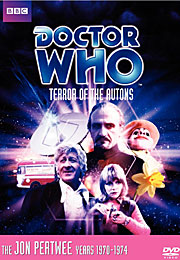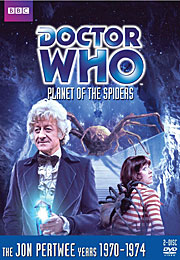Nicholas Courtney, Roger Delgado, Richard Franklin, John Levene
Nicholas Courtney, Richard Franklin
- Sci-Fi
- 1971
- Buy the DVD
Reviewed by Ross Ruediger
()
his month sees a noteworthy pair of classic “Who” stories hitting the silver platter, including Jon Pertwee’s swansong, “Planet of the Spiders.” But before getting there, let’s first travel back to 1971.
Though “Terror of the Autons” kicked off producer Barry Letts’s second season, it was the first story he had a solid hand in guiding. (The previous year had been crafted in large part by outgoing producer Derrick Sherwin.) Letts wanted to bring a warmer feel to the show, so out went the Doctor’s scientist companion Liz Shaw, and in came the bubbly Jo Grant (Katy Manning), as well as the dashing Captain Mike Yates (Richard Franklin). The pair, along with the Doctor (Jon Pertwee), the Brigadier (Nicholas Courtney) and Sergeant Benton (John Levene), helped Letts bring the “family” to UNIT. But there was one piece of the puzzle missing, and Letts and script editor Terrance Dicks surmised that the relationship between the Doctor and the Brigadier had grown into a Holmes/Watson dynamic, so they felt the show needed a Moriarty, as well. Enter the Master.
Letts claims that Roger Delgado was always his first and only choice for the Doctor’s arch-nemesis, and from the moment he appears onscreen, it’s easy to see why. Right off the bat Delgado is, in the words of Frank Booth, “one suave fucker.” He looks like he’s been playing the part for years rather than minutes, and as a viewer you immediately understand him and get where he’s coming from. Yet the Doctor doesn’t seem to view him as an immediate threat, and frequently in the story it’s almost as if he’s looking forward to sparring with someone who’s an equal.
The Master has stolen a Nestene energy unit – the only surviving artifact from the Nestene/Auton invasion from the previous season’s opener, “Spearhead from Space” – and he uses it to contact the Nestenes, which jump-starts a brand new invasion. The Master takes over a plastics factory and the company begins building creatures and objects made of plastic that can take over the world. From there, the story pretty much turns into a cat and mouse game between the two Time Lords, as one tries to stop the other.
“Terror of the Autons” is really a very simple, unchallenging piece of fluff, but it’s an immense amount of fun. Pertwee has settled nicely into his character, the Brigadier has loosened up a little, and Jo Grant brings a great deal of playfulness to the table. The dialogue is loaded with great one-liners, such as:
Rossini: "Come, come, Doctor – gentlemen don't discuss money."
The Doctor: "Nonsense; gentlemen never talk about anything else."
The serial gets loads of mileage out of living plastic on this go around, and there are killer dolls, killer chairs and killer flowers dotted throughout. On the other hand, the Autons, who were so chillingly prevalent in “Spearhead,” take a backseat here to all of the other gimmickry, and they really only have a couple of truly standout scenes. So if you’re looking for a great sequel, you won’t find it here, but as a standalone piece, it has just enough goods to make it worthy.
The biggest problem “Terror of the Autons” has is in its look, which is just jam-packed with dodgy CSO. Normally I’m not a big critic of this aspect of the Pertwee era, because it’s so common during his tenure that, were it a deal breaker, one would have to write off the bulk of his stories. When you’re on a shoestring budget and you’ve got to create an alien planet, you’ve got to do what you’ve got to do. But these were early days for Letts (who also, unusually for a “Who” producer, directed this as well), and he seems to be experimenting, and trying to find out what he can get away with. As it turns out, placing a woman against the backdrop of her kitchen is going too far (and that is but one example of how ludicrously the technique is applied to this tale). Especially when compared to how slick “Spearhead” (which was shot entirely on film) looked, this can’t help but frequently feel cheap. On the plus side, the Restoration Team have done their usual sterling work, and this story, which for years existed only in black and white, has been restored to full, vibrant color. It’s not quite “Planet of the Daleks” Part Three spectacular, but it’s still pretty impressive.
Moving on to this month’s other offering, 1974’s “Planet of the Spiders,” which was produced, directed and co-written by Letts, we go to the other end of Pertwee’s era – the very end, in fact. “Spiders” has taken more than a few beatings over the years, but I wonder if that has mostly to do with the fact that it’s the Third Doctor’s last story, and people just wanted something more epic. Admittedly, it’s a valid criticism, but I can’t help but think that if the story hadn’t been his finale – if it had been a story in another season or whatever –that people might not be so quick to dismiss it.
It had been years since I’d last watched it, so I went in skeptical, and came out the other side feeling as though I’d viewed some classy, thoughtful ‘70s-era “Doctor Who.” Letts was a lifelong Buddhist, and while he’d previously never shoved it down the throats of viewers, here he appears to want to make a story that’s personal to him. Off the top of my head, I can’t think of any other story in the history of the show (classic or current) that so thoroughly embraces the concept of auteur. As such, “Spiders” demands to be cut some slack. It feels like Barry Letts’s goodbye, more so even than Pertwee’s (even though Letts did oversee “Robot,” Tom Baker’s first serial).
The tale sees the return of the blue crystal the Doctor stole from Metebelis III back in “The Green Death.” He’d given it to Jo Grant as a wedding present, and she’s sent it back to him as it’s been causing her problems. These days the Doctor is hanging with Sarah Jane Smith (Elisabeth Sladen), but she’s off connecting with Mike Yates, who’s been dismissed from UNIT due to his involvement in Operation Golden Age (“Invasion of the Dinosaurs”). Yates is spending time at a meditation retreat, trying to clear his mind, when he stumbles upon some sinister goings-on in the basement. A group of men are trying to summon something horrible – giant spiders from Metebelis III…and they want their crystal back! Eventually, the Doctor and Sarah make it to Metebelis III, and the Doctor must face his fears.
The first half of this six-part story works incredibly well, and the show is littered with all sorts of colorful characters: Cho-Je (Kevin Lindsay), the mystical monk; Lupton (John Dearth), a broken man trying to find power where there isn’t any to be had; and Tommy (John Kane), a simpleton whose brain ends up going through a radical transformation due to the crystal. Episodes Four and Five, set mostly on Metebelis III, don’t quite live up to the opening installments, due mostly to the fact that the peasant characters, who are slaves to the spiders, are not as well-drawn as the folks back on Earth, and their costumes are very silly. But in the final episode everything pretty much comes back around to deliver a sweetly tragic, but winning ending. There’s some more of that dodgy CSO to be found here, but it doesn’t really harm the goings-on and, hell, even the spiders look pretty good by mid-70s “Who” standards. This is a story in desperate need of fan reevaluation, and this DVD should be the first article introduced into evidence.
Random Fact: This is the first time the word “regeneration” was used to describe the metamorphosis the Doctor goes through when near death.
Special Features: “Autons” features a lively commentary with Katy Manning, Nick Courtney and Letts, but it’s somewhat sad because two of the participants are no longer with us. “Life on Earth” is a fine making-of that in the second half turns into an interesting compare-and-contrast between the classic and current series. “The Doctor’s Moriarty” is a look back at the Master and “Plastic Fantastic” is a look at how the writers came to view plastic as a viable villain.
If the audio commentary for “Autons” is sad, then the commentary for “Spiders” must be downright morose, given that three of its participants (Letts, Courtney and now dear Lis Sladen) have all passed on. Of course, it isn’t morose to listen to, but it’s more than a tad heartbreaking to hear Lis sounding so damn alive; it feels like all her words and thoughts here were recorded yesterday. Also on the track are Richard Franklin and Terrance Dicks. “The Final Curtain” is a great making-of that also, as is to be expected, celebrates the end of the era. “John Kane Remembers…” is an interview with the actor who played Tommy that’s utterly charming. “Directing Doctor Who” is a look at Letts’s directing contributions to the show, and “Now and Then” is another look at the locations.
There’s an unrestored “Omnibus” edition of “Spiders” on here, which edits the story down to a 105-minute movie, and would probably only be of true interest to someone who saw it broadcast that way back in the ‘80s or whenever it was screened. There’s also a trailer for that Omnibus broadcast. Both “Autons” and “Spiders” also feature the usual photo galleries, production note subtitle options, PDF materials and the same trailer for “Frontios,” which is due out next month.
You can follow us on Twitter and Facebook for content updates. Also, sign up for our email list for weekly updates and check us out on Google+ as well.














